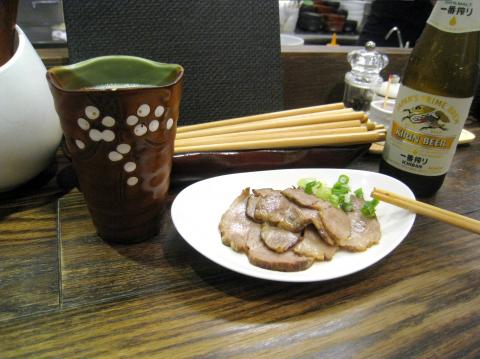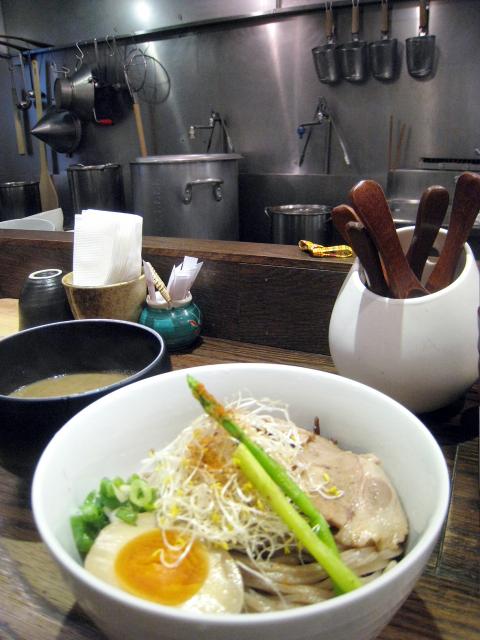Taipei residents have been extremely lucky over the last couple of years, as a number of outstanding Japanese ramen restaurants have opened shop here. The wide range of ramen preparations is becoming evident, and it is no longer a case of just going to a place for a bowl of Japanese noodles, but about choosing between excellent versions from Hokkaido to Kyushu. A notable entry into the increasingly crowded market segment that opened early this year is Enishi, which hails from Kyoto, and is distinct both in the flavor of its food and the style of presentation.
Enishi is all about cool, sophisticated minimalism. It is hidden away on a back street, and its frontage is so low key that it is easy to miss. There is just a wooden door in a concrete wall and a small round window placed just a little too high to see inside. There is a tiny menu placed on a metal music stand outside, which lists the two main items offered, and a couple of side dishes. Basically, all that you discover is that Enishi offers dipping noodles (沾麵) and soup noodles (湯麵), the prices NT$250 and NT$280 respectively, putting it at a relatively high price point for something so seemingly simple.
And the food is simple, so simple that you cannot escape the self-assurance verging on arrogance that it expresses. The bowl of dipping noodles comes with a small wad of alfalfa sprouts, half a boiled egg and a slice of roast pork. The dipping sauce in a separate bowl is a pale brown and unadorned. Absolutely no culinary bling, no added extras.

Photo: Ian Bartholomew, Taipei Times
The attitude extends to its pricing. Both dipping noodles and soup noodles come in three sizes, with noodle portions from 140g, 210g and 280g, all priced the same. No small price hikes for the extra noodles. More or less is about what you need for a satisfying meal, not a question of price.
And then there is the open kitchen and the quiet black-clad chefs manning their stations. The restaurant itself is simply a long bar where customers sit looking directly onto the ruggedly industrial kitchen equipment with its huge soup pots, its boilers, and its commercial refrigeration units, all cold steel and hard edges. For all that, the surfaces are kept spotless and the kitchen is clearly an organized and highly professional workspace.
The noodles at Enishi are made of whole wheat, and it should be noted that Enishi emphasizes that this is ground from the whole grain, thereby preserving all the nutrition of the germ that is lost with the use of commercially produced wheat flours, even whole wheat (the presence of the germ greatly reduces shelf life of the flour). The noodle has an intense flavor with echoes of Japanese buckwheat soba noodles, but has the firmness of wheat. You watch as the noodles are cooked, immersed in boiling water, then washed in ice water before being dried with a vigorously swing of the basket holding the noodles, before being place in the bowl.

Photo: Ian Bartholomew, Taipei Times
The dipping sauce is notable for combining pork stock and stock made from dried fish. It is a heady mixture of strong flavors, and the noodles only need to be dipped in briefly before being sucked down. The texture of the noodles against the strong flavors of the sauce are a great gastronomic sensation, and for those who take their noodles seriously, it is the kind of experience that immediately has you planning your next visit. The dipping sauce can be topped up with clear stock to make a strongly flavored soup with which to complete the meal.
While the noodle dish provides only one (though quite generous) slice of roast pork, additional meat can be obtained as a side dish (NT$50), which is warmed using a blowtorch flame directly applied to the meat. For those looking for a more hearty meal, a bowl of mixed grain rice is available for NT$30, which can be eaten on its own or mixed with the sauce and eaten as a porridge (recommended).
There is a small selection of desserts. The homemade yogurt (特製和風優格, NT$50) is an excellent choice. The yogurt itself is tangy and slightly sour, and is topped with a syrup made of black sugar that adds a hint of sweetness, but more importantly, it adds a complex flavor of unprocessed sugar. Tea is provided free with meals, and Enishi also serves bottled Kirin beer (NT$70) imported from Japan, a very different beast from the tinned variety generally available here.
Service is efficient, but plating lacked just a little in its precision. The simplicity of the food focused attention on the smallest details, and even small smears of sauce up the side of the bowl that would be ignored at most noodle restaurants, appeared at Enishi to be sloppy. The absence of tables makes Enishi unsuitable for big parties, but ideal for the lone diner or groups of two or three, who can sit at the counter and enjoy the interesting mixture of pared down simplicity and culinary theater.

From the last quarter of 2001, research shows that real housing prices nearly tripled (before a 2012 law to enforce housing price registration, researchers tracked a few large real estate firms to estimate housing price behavior). Incomes have not kept pace, though this has not yet led to defaults. Instead, an increasing chunk of household income goes to mortgage payments. This suggests that even if incomes grow, the mortgage squeeze will still make voters feel like their paychecks won’t stretch to cover expenses. The housing price rises in the last two decades are now driving higher rents. The rental market

July 21 to July 27 If the “Taiwan Independence Association” (TIA) incident had happened four years earlier, it probably wouldn’t have caused much of an uproar. But the arrest of four young suspected independence activists in the early hours of May 9, 1991, sparked outrage, with many denouncing it as a return to the White Terror — a time when anyone could be detained for suspected seditious activity. Not only had martial law been lifted in 1987, just days earlier on May 1, the government had abolished the Temporary Provisions Effective During the Period of National Mobilization for Suppression of the Communist

Hualien lawmaker Fu Kun-chi (傅?萁) is the prime target of the recall campaigns. They want to bring him and everything he represents crashing down. This is an existential test for Fu and a critical symbolic test for the campaigners. It is also a crucial test for both the Chinese Nationalist Party (KMT) and a personal one for party Chairman Eric Chu (朱立倫). Why is Fu such a lightning rod? LOCAL LORD At the dawn of the 2020s, Fu, running as an independent candidate, beat incumbent Democratic Progressive Party (DPP) lawmaker Hsiao Bi-khim (蕭美琴) and a KMT candidate to return to the legislature representing

Fifty-five years ago, a .25-caliber Beretta fired in the revolving door of New York’s Plaza Hotel set Taiwan on an unexpected path to democracy. As Chinese military incursions intensify today, a new documentary, When the Spring Rain Falls (春雨424), revisits that 1970 assassination attempt on then-vice premier Chiang Ching-kuo (蔣經國). Director Sylvia Feng (馮賢賢) raises the question Taiwan faces under existential threat: “How do we safeguard our fragile democracy and precious freedom?” ASSASSINATION After its retreat to Taiwan in 1949, the Chinese Nationalist Party (KMT) regime under Chiang Kai-shek (蔣介石) imposed a ruthless military rule, crushing democratic aspirations and kidnapping dissidents from